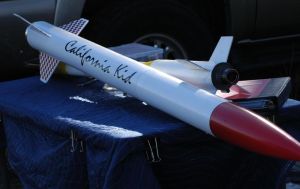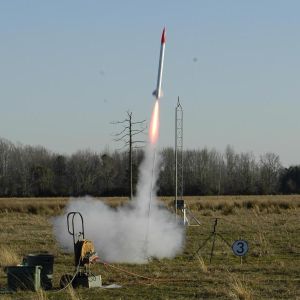| Construction Rating: | starstarstarstarstar |
| Flight Rating: | starstarstarstarstar |
| Overall Rating: | starstarstarstarstar |
| Manufacturer: | Binder Design  |

Brief:
I recently purchased a Binder California Kid rocket so I could obtain my Level
2 certification. It turned out to be a smart choice. I ordered the kit directly
from Mike Fisher at Binder because of his quick responses to questions and the
$10 discount on the proper avionics bay if purchased at the same time as the
kit. Nice perk!
The kit arrived via USPS in perfect condition. As others have said the packaging was superb. Every sub-assembly was individually sealed in its own compartmented portion of the plastic envelope. The body tubes, fins, and centering rings were of the proper thickness and material. Fins and centering rings are made of quality plywood and were accurately dimensioned.
Construction:
The instructions booklet was an 11 page document that carries you through the
build process fairly smoothly. Several illustrations were provided to help
understand some of the more unusual operations. The artwork was crisp and
clear. Several times the instructions directed you to read the sub-assembly
instruction packed with the sub-assembly components. For me this was a minor
annoyance, as I like to read and digest the entire process several times before
beginning the project. Adding the sub-assembly instructions in the appropriate
place of the main instructions would have been more efficient from my
perspective.
Construction was a piece of cake, straightforward, and clear. Almost everything went as advertised. A nice feature of the main instruction packet was the checkboxes for each step. This kept me on task and focused as to what should follow what.
An area that resulted in an assembly I was not completely satisfied with was the fin can. Binder has developed a fin can concept for the typical non-fin can model. It is a very nice idea where the fins are initially tacked to the 54mm motor mount at the root only, then the aft portion of the body tube is cut away and the fins and motor mount are removed for further reinforcement.
While building the fin can, the instructions failed to state that when inserting the fins through the body tube slots and after contacting the motor mount, the fins should be slid aft to contact the aft centering ring. After I installed the fins through the body tube, I slid them forward to contact the edge of the fin slot. My reasoning was that since I had measured the forward slot end and found them to be the same distance from the aft end of the tube, which was not the case for the aft end of the slot, that was the place the fins would be best located. The overall result was that the forward centering ring ended up flush with the end of the motor tube rather than having about a ¼" of the motor tube extending past the centering ring. A slightly longer motor tube would have been nice as well.
The fin can concept works well though, and should/could be incorporated into many other designs. One of the best features of the fin can is the ability to reinforce the fins properly to the motor tube and centering rings. No longer do you have to use some sort of finger extension to put epoxy on the fin/tube junction and hope it's the right amount in all the right places!
Binder recommends using JB Weld for all of the motor retaining ring (54mm Slimline style) and aluminum nozzle assembly. I couldn't agree more. It's the stuff to use when heat is involved. Binder also recommends using their milled fiber with 30-minute epoxy when attaching fin to tube and other high stress joints. Please, go one step further and use West System or Aeropoxy products. The quality, strength, and system nature of these products makes for a better joint with consistent quality throughout the build. I chose West 105 resin with 206 slow hardener. I used #406 filler for the motor tube/fin joint. I mixed the filler in to a consistency of peanut butter (West guidelines) and placed it on all joints. Because of the consistency, I was able to complete all joints at the same time. The epoxy mixture didn't run, allowing for a quicker assembly.
After the fin can assembly was complete, I slid it back into the body tube and used #404 filler mix in when I epoxied the can to the body tube. After drying overnight, I added fillets to the fin/body tube joint again using West System with #404 filler. Those fins are there to stay!
The balance of the build was simple and straightforward. I decided because of time constraints to build the apogee deployment version. My Level 2 cert day was approaching fast and having never done dual deployment before, I employed the KISS principle. Final build weight sans motor was 61oz. Fully loaded with a J420R, it tipped the scales at 84oz.
Finishing:
I used the recommended Krylon paint and had my wife assist in the application
of the vinyl decals. The rocket came to life with the finishing touches
completed! Nice decals Binder!
Construction Rating: 5 out of 5

Flight:
I finished the California Kid Friday late in the evening in preparation for my
Level 2 Certification flight the next day. The paint was still drying as the
decals went on. Not too much pressure!
I arrived at Whitakers around 11:30am on Saturday. The weather was cool and breezy and winds were around 10 knots. RockSim said 4590 feet under calm conditions.
First step was to take the Level 2 test. With the test taken and passed all that was left was to be observed building the motor, a J420R, and the safety inspection by the RSO.
This was to be my cert flight and the maiden flight for the California Kid, and on a J no less! Rocket prep is simple and with a 4" tube, fitting in 20' of tubular nylon and the supplied 36" parachute posed no problems. I added a Nomex® sleeve for the lower portion of the shock cord as well as a Nomex® parachute protector. The kit included all necessary quicklinks and a very nice ball bearing swivel for the parachute.
Since I was going to use a J420R, I needed a 38mm motor adapter. Tape was out of the question, so in planning for this flight, I had purchased a Slimline 38mm motor adapter tube assembly. This made the installation and retention of the motor a no brainer. Safe and simple, a great combination.
Having run several RockSim simulations, the recommended delay was just a shade under 12 seconds. This caused me to get another tool. (I love tools and gadgets!) I used the new AeroTech Delay Adjustment Tool with my Cesaroni Delay tool and took the long (14 seconds) delay and removed 2 seconds from it giving me the requisite 12 seconds.
The launch pad system at Whitakers was having some minor trouble on the high power pads delaying my launch. We resolved the problem and by 4:30pm I was finally able to see if all of my work, Binder's design, and AeroTech's chemistry would come together successfully.
5, 4, 3, 2, 1...WOOSH straight up and nearly out of sight.
Recovery:
At the top of the arc the chute popped as advertised. 4500+ feet, 10 knots of
breeze, and a 36" chute means it was going to be a long walk. The good
news: The field it landed in was recently harvested so it was easy to find and
the rocket was in perfect condition! Level 2 certified!
Flight Rating: 5 out of 5
Summary:
Binder has created a fine kit. Materials, instructions, and design result in a
stylish and functional craft that really looks good on the ground and in the
air. I purchased the kit because of the looks (Oh, that aluminum nozzle
assembly!) and I was rewarded with a beautiful flight and a rocket I'll be
flying for years to come, the Flying Friar permitting!
Overall Rating: 5 out of 5
 |
 |
Flights
 |
 |
Sponsored Ads
 |
 |












C.S.D. (February 22, 2006)